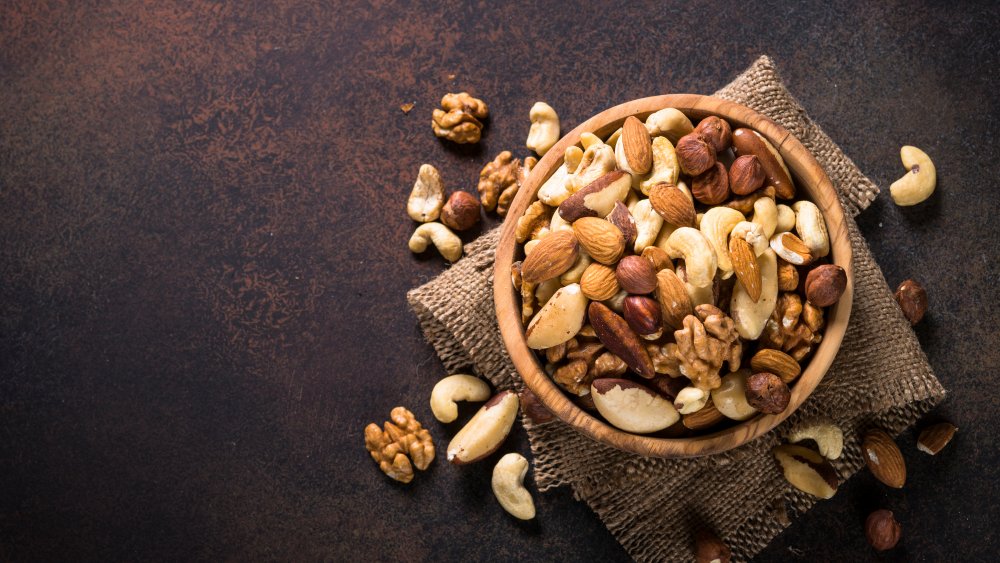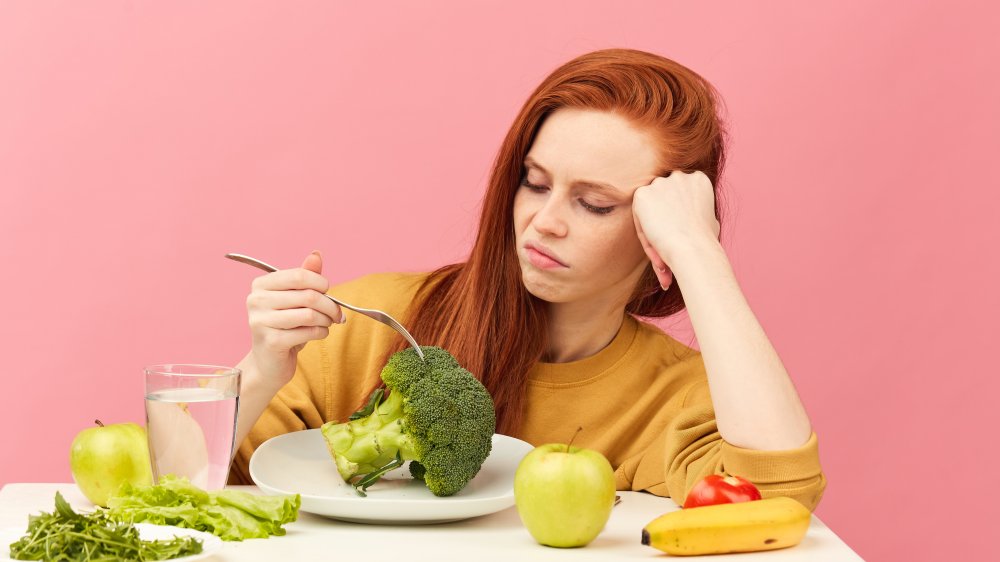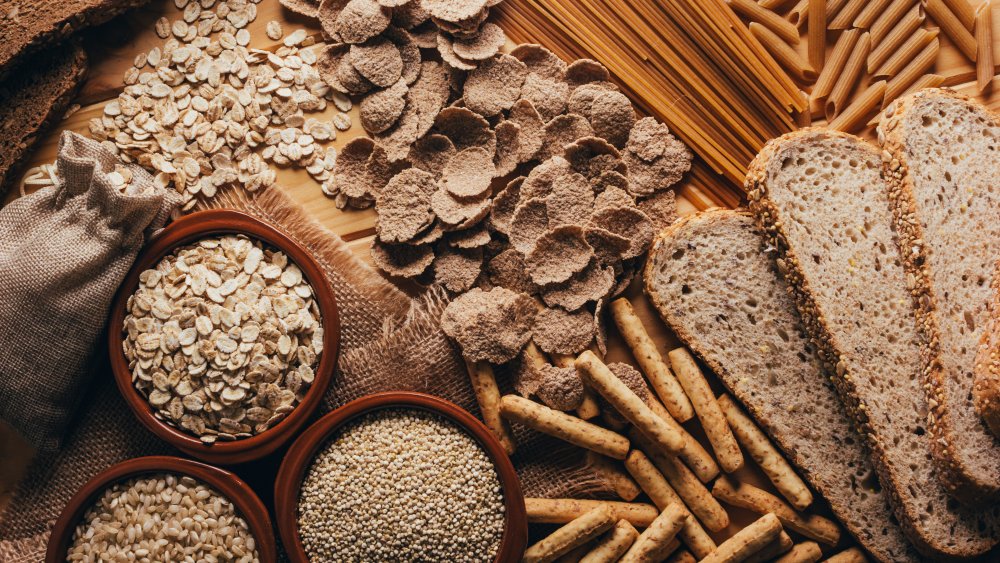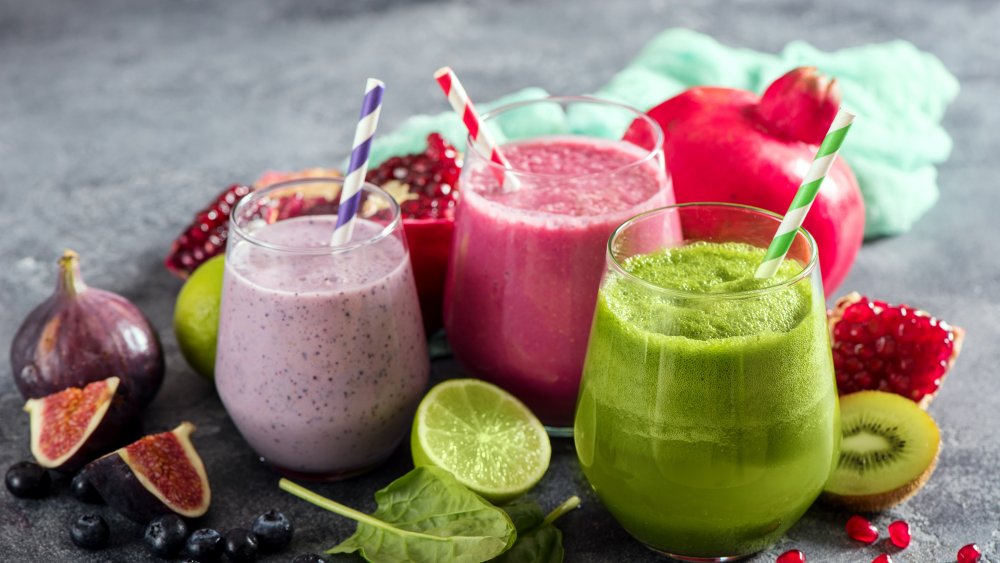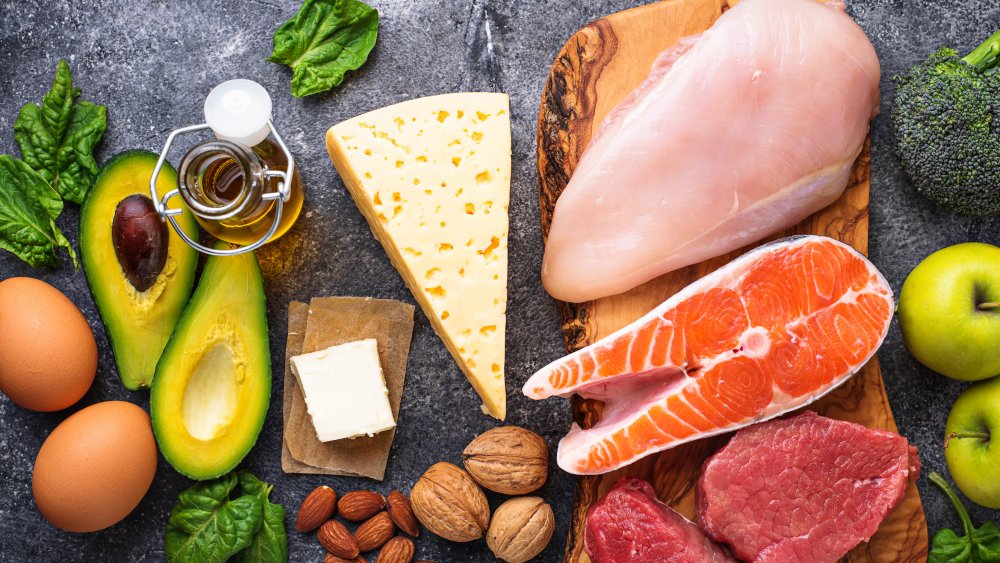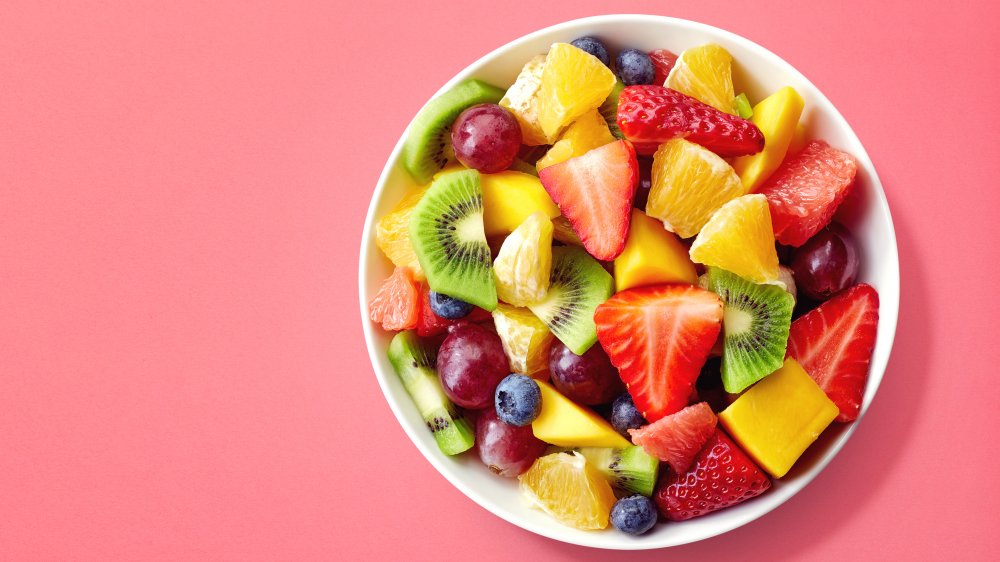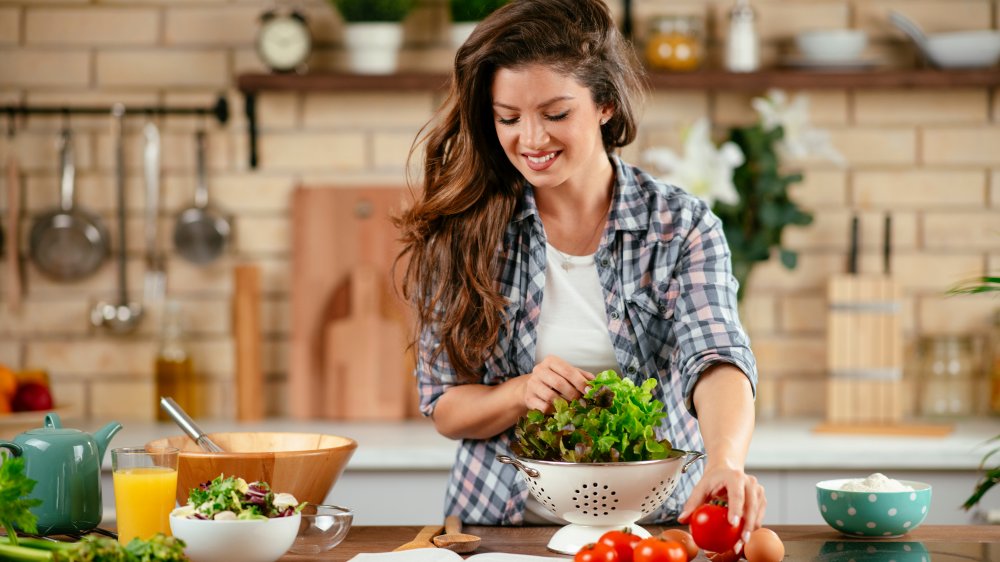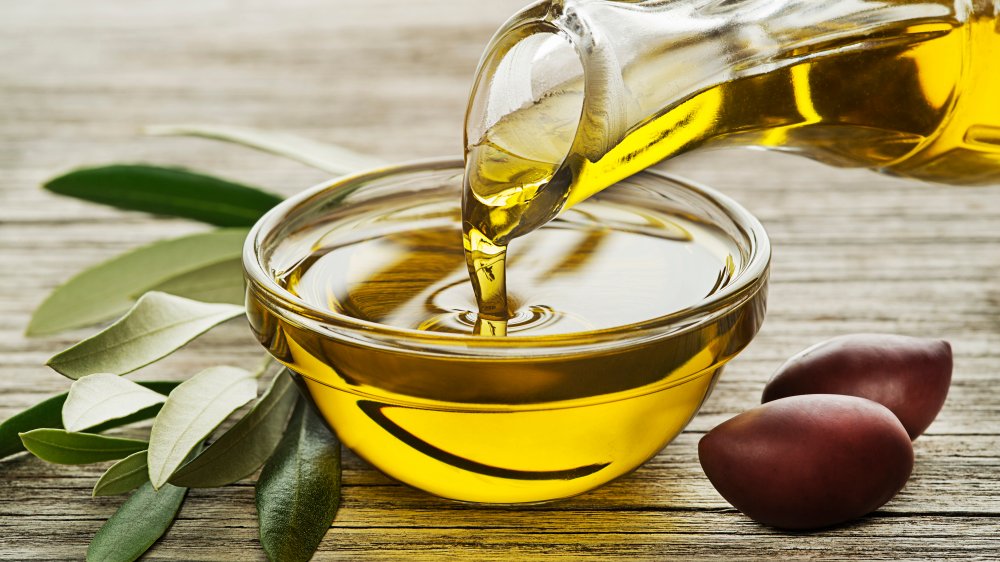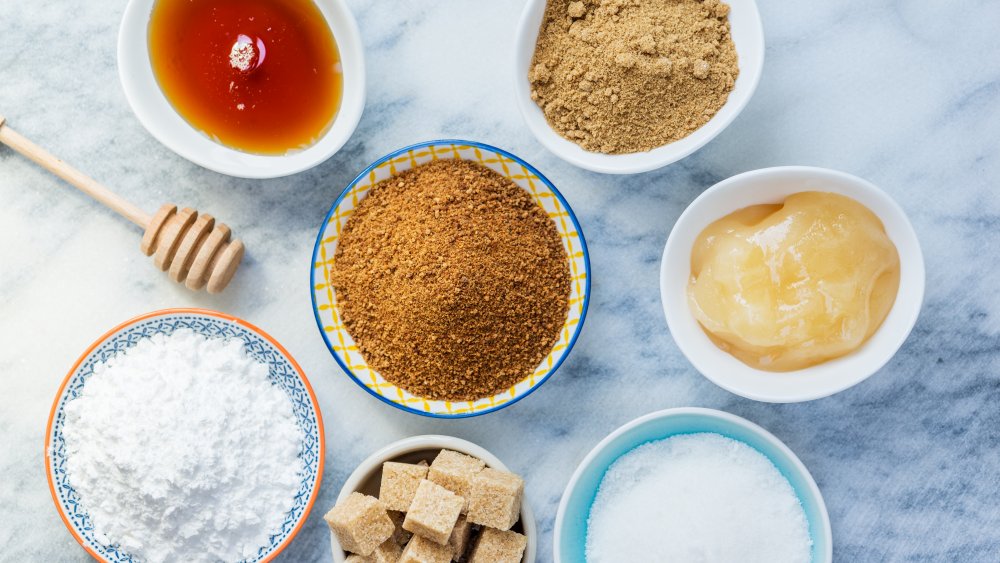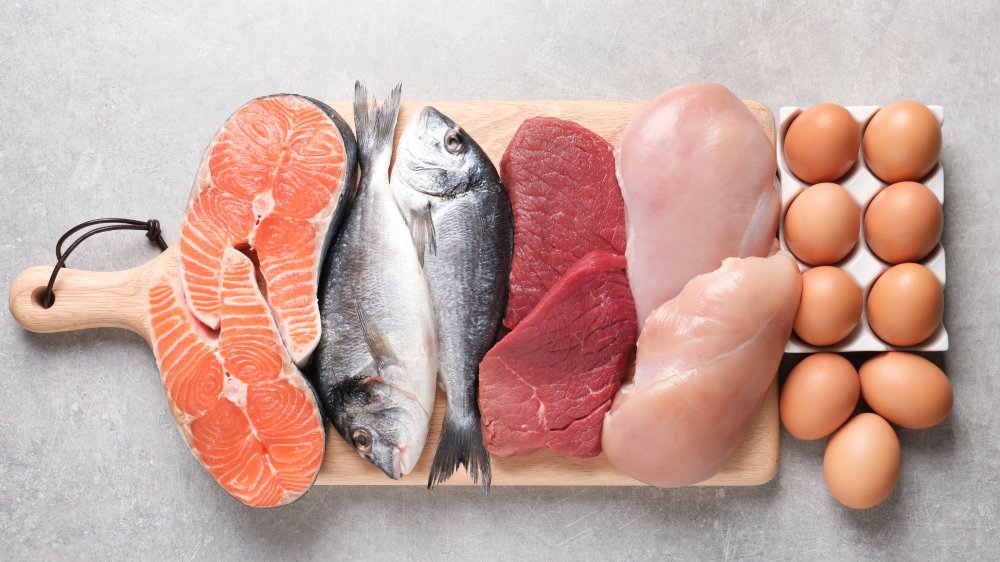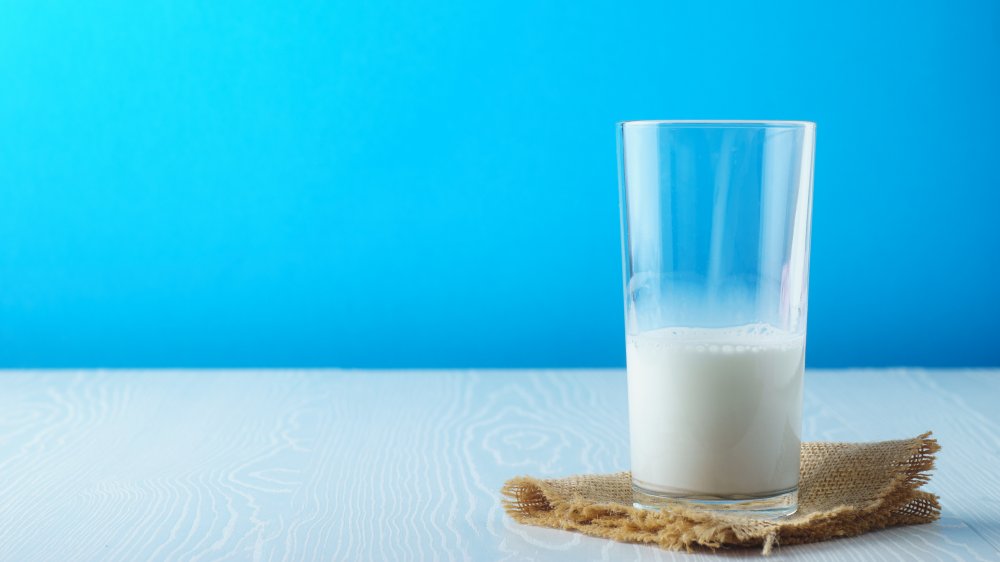Healthy Habits You Never Realized Were Ruining Your Diet
You may think of healthy habits to mean counting calories, reading food labels, eating all your favorite fruits and veggies, et cetera. You may engage in these habits hoping to lose weight and are yet left wondering why the scale still refuses to budge. It is a frustrating yet common conundrum when your seemingly healthy diet doesn't expedite the shedding of extra pounds.
As it turns out, there are a few habits that might just be hindering your weight loss — and, no, we are not talking about that one-time, late-night ice cream binge session (that can be our little secret). We are referring to the way less obvious pitfalls of an otherwise balanced plan. Did you suddenly go vegetarian, cut out all carbs, up your protein intake, or buy all the varieties of healthy nuts? You may be sabotaging your own success. Want to know how else you are ruining your diet? Health Digest is sharing all the healthy habits you never realized were ruining your diet.
Snacking on too many good-for-you nuts
You made a special trip to the grocery store and implemented special snack tunnel vision to avoid the chips, cookies, and treats. Instead, you stocked up on nuts — and plenty of them. Indeed, nuts are generally a good choice when you are watching what you eat. Registered dietitian nutritionist Jerlyn Jones told Prevention that nuts are chock full of good things you body needs like fiber, protein, vitamins, minerals, and antioxidants. They're also high in fat — healthy fat, but fat nonetheless — so she cautioned snackers to pay attention to the serving size, which is usually around one-quarter cup.
As noted by the Mayo Clinic, you will also want to look at salt and sugar content, too, as these additional ingredients can cancel out the health benefits of nuts. Sorry to say those chocolate-covered peanuts aren't the same as unsalted dry-roasted peanuts. Furthermore, as noted by Psychology Today, regardless of how healthy a food may be, "overeating is overeating. And binge behavior is still binge behavior."
Eating a giant salad every day
Supersizing your salad may sound like a smart plan; who doesn't need more greens and veggies in their daily diet? But, depending on the ingredients in your ginormous salad, you could also be eating lots of non-green foods. As noted by Verywell Fit, some of the common salad extras that pile on excessive fat and calories include croutons, cheese, fried chicken, or lunch meat. Don't worry, you can have your protein and eat it too — just stick to lean cooked chicken, turkey breast, or grilled shrimp, as recommended by the site. And maybe think twice before pouring a ladle full of ranch dressing on top of your greens.
As noted by Verywell Fit, most store-bought dressings are high in calories and fat. Plus, if you look at the recommended serving size, you'll see it's based on only a tablespoon or two. One way to avoid this diet-ruiner? Squeeze some lemon or lime juice on your salad instead — or try balsamic vinegar. And if you need to have your favorite blue cheese or vinaigrette when out to eat? Ask for a serving on the side, recommended the publication.
Being too strict with your diet
It's entirely possible to be too strict with your eating rules. This can lead to diet fatigue, eventually causing you to fall off the healthy-eating wagon. Moderation is the key to success. As noted by SFGate, this approach helps you rein in portions, but provides you freedom and flexibility to have all sorts of foods in your diet.
Yes, it's important to eat food when you're hungry and not deprive yourself of the occasional treat. Moreover, it's critical that you don't skip meals thinking it'll help you lose weight faster. In fact, this can have many negative consequences. You'll feel tired and moody (aka hangry), and you may even find yourself overeating at the next meal or binging on goodies in a desperate act of starvation. What's more, this type of restriction can lead to yo-yo dieting, and that can "mess with your resting metabolism, which is the way your body burns calories in order to function," as explained by Prevention. "Because your meal times are so unpredictable, your body will keep what it can and won't burn calories efficiently."
Cutting out all carbs
No, despite popular belief, you do not need to give up your beloved carbs to lose weight and maintain a healthy diet. It is possible to have your bread, and eat it too! Good news: A study sought to find a correlation between carb-intake and obesity and could not make a direct connection.
Still, that does not mean you will want to sustain on pasta, rice, and crackers alone. In fact, it is true that reducing your consumption of processed or refined carbohydrates can indeed help boost weight loss, as noted by Clinical Nutrition and Metabolic Care. Yes, "carb-laden junk foods" boast pretty much zero "nutritional value," making them the "biggest contributors to excess calories," explained Healthline. Moderation is key, as is focusing on fiber-filled carb options and whole foods.
"Some people do well with fewer carbs, while others function just fine eating plenty of carbs from healthy food," Healthline highlighted. "In any case, whole-carb foods can be part of a healthy diet and don't need to be avoided at all cost."
Drinking a smoothie a day
Sorry to be the bearers of bad news, but a smoothie a day won't keep the weight gain away. Many pre-bottled or purchased options are loaded with added sugar. Not only does this make a smoothie high in calories, it also decreases its "nutrient density," as noted by Healthline. Something you thought was chock-full of vitamins and minerals may, unfortunately, not be all it's chalked up to be.
It's important to know what is and isn't in your blended drink or smoothie bowl. Smoothie bowls can be especially deceiving as they look colorful and healthy, but are often are topped with sugar-coated granola and coconut flakes, registered dietitian Miranda Hammer told Time. Options that boast fruits but are balanced with plenty of leafy greens are a better choice as those veggies will help to regulate your blood sugar and keep you satiated for longer, dietitian and author Ryan Andrews explained to the publication.
Better yet: Instead of getting a smoothie from a juicing joint, make your smoothie at home. This way you can better control the ingredients — just make sure to use whole fruits and add a touch of honey to sweeten it up, as recommended by Healthline.
Cutting out all fats
The word "fats" can be deceiving, especially when you are trying to maintain a healthy diet. You may think that completely eliminating foods that have fat may be the answer to your weight loss woes. But, it turns out, your body needs healthy fats; they're particularly important when you are dieting. Registered dietitian Marjorie Nolan explained to WebMD, "Fat helps you stay full. It satiates you. If you cut all of the fat out of your diet or have very little fat, your blood sugar doesn't stay stable for as long a period of time and you notice that you're hungry sooner," Nolan explained.
So how much fat is too much fat? The Cleveland Clinic recommends taking in about 30 percent of your calories from fats, and suggests seeking healthy sources of fat. Choose "unrefined" oils, snack on nut and seed butters made without added sugar, cube an avocado, and try to opt for grass-fed meat when possible. Stay away from cholesterol-raising trans fats, which are frequently found in processed foods. A tip-off word that lets you know to steer clear of a packaged item: "partially hydrogenated oil."
Exercising too often
You may think that working out for hours every day of the week will help you lose weight quicker. While exercise is, of course, a key component to getting and staying healthy (and seeing that number drop on the scale), it's important to schedule in regular rest days too.
Giving your body a break enables your muscles to recover, rebuild, and regenerate. And, as noted by Healthline, "when you have more muscle, you'll burn more calories at rest" because "muscle burns more energy than fat." Basically, a rest day helps set you up for future success. "Under fueling" your body with too few calories and excessive exercise may help you lose some initial pounds, but your weight loss will soon stall and you'll end up burning muscle instead. It's completely "counter-productive," as pointed out by Livestrong — not to mention wholly unpleasant. Furthermore, taking it easy for a whole 24 hours may keep you from experiencing workout burnout and help steady your path to more longterm success.
Eating too much fruit
It is possible to overeat fruit, Melina Jampolis, physician nutrition specialist, wrote in a report for CNN. It's certainly not a "free food," according to the expert, and people should be more mindful of their choices as most fruits are fairly high in calories. Dr. Jampolis pointed out, though, that excessive consumption of any food is not a great idea when you are watching your waistline.
Fruit is, of course, a healthy addition to your diet; it's loaded with vitamins and minerals, chock-full of fiber, and high in water content, so it's definitely a smart snacking option. Nevertheless, Jampolis advised readers to limit their fruit servings to no more than three each day and be mindful of portion size. Furthermore, she advised forgoing dried fruit, canned fruit, and fruit juices, as these options tend to have more calories and less fiber. Stick to fresh fruit if you want to lose weight, and treat it like a treat!
Drinking a nightly glass (or two) of heart-healthy red wine
You look forward to a hearty pour of red wine each night — and you refuse to feel bad about drinking something that's good for your ticker. Indeed red wine — in moderation — is rich in antioxidants and is thus a heart-healthy option (via Insider).
Yet and still, it turns out that your evening vino routine could be hindering your weight loss attempts. As noted by the Cleveland Clinic, a 5-ounce serving of cabernet will set you back 122 calories. But as sommelier Victoria James told Self, "You're probably pouring yourself 7 to 9 ounces, and, let's be honest, you're probably having more than just one."
What's more, drinking alcohol of any variety (even one that boasts health benefits) can impede your judgment, leading you to make some not-so healthy food choices, as noted by the health institution. So what's a wine aficionado to do? Try to make it an occasional treat instead of a nightly must-have, and use portion control; allow yourself a 4-ounce pour only, as recommended by the American Heart Association, and enjoy. Cheers to a successful diet!
Adopting a vegetarian lifestyle in an effort to lose weight
While many choose a vegetarian diet for ethical reasons or to address certain specific health concerns, others broadly believe that eliminating all meat products will help them drop weight quicker. But, as noted by WebMD, just because a food is vegetarian, it doesn't automatically make it "low-fat or low-calorie."
What's more, you have to be mindful of what you're eating in place of meat. Registered dietitian Marjorie Nolan explained that "if you're eating carbohydrate or starch-rich foods, calorically, you might be eating more" than if you kept up with a balanced diet with meat instead.
So how can someone reduce their meat intake and avoid ruining their diet? "Make vegetables the centerpiece of each meal. Add whole grains, fruit, and other healthy non-meat foods. Make sure you get enough protein from vegetable sources like beans, nuts, and tofu and essential amino acids from foods like brown rice," as advised by WebMD.
Being heavy-handed with the olive oil
You may have heard that olive oil is a healthy choice for cooking, dipping, drizzling, and pouring — heck, some people swear by drinking a quarter cup of it a day.
Indeed, the versatile Mediterranean ingredient has many health benefits. A noted by Livestrong, it is loaded with antioxidants that protect you from inflammation, and it may even be good for your cardiovascular system, even reducing your risk of heart disease and stroke.
Nevertheless, despite its many positives, olive oil is high in calories and fat. If you are trying to maintain a healthy diet, you will want to use it in moderation. Too much of a good thing can backfire, and overuse may result in weight gain. Livestrong noted that a serving size (one tablespoon) boasts 119 calories, so be sure to measure out and portion your olive oil appropriately — and maybe avoid downing it like water.
Completely cutting out sugar
Reducing your sugar intake can be a good move when you're trying to lose weight or maintain a healthy eating plan. But swearing off all sugar might not be the answer, nor is replacing it with artificial sweeteners.
In moderation, the use of products like saccharin and aspartame can reduce your need for added sugar — like when spooned into your morning cup of coffee. Still, some doctors and nutritionists believe that these products can do more harm than good. First and foremost, they can lead someone to falsely assume they're able to indulge in other ways. Dr. David Ludwig, a weight-loss specialist at Boston Children's Hospital, told Harvard Health that many people think, "I'm drinking diet soda, so it's okay to have cake." Furthermore, the health institution's site pointed out that some sweeteners have been shown to fuel sugary cravings and may even be addictive.
The important thing to remember is that sugar is not all bad; added sugar is the bigger culprit in your diet woes. "Sugar-containing foods in their natural form, whole fruit, for example, tend to be highly nutritious — nutrient-dense, high in fiber, and low in glycemic load," explained Ludwig.
Eating a protein-heavy diet
Don't get us wrong: Protein is good for you. It's an important component of a healthy diet. But a 2015 study published in Clinical Nutrition found that people whose diets consisted of higher amounts of meat protein were more likely to gain weight than those who consumed less protein. It all boils down to portions and moderation.
It's important to distinguish the different types of protein in your diet too, as they are not all created equal. There's a plethora of options — from beans to steak to eggs. If you find that you are gaining weight, it could be that you're eating too many fatty meat products. Swap out a serving for something like Greek yogurt instead, as suggested by Women's Health.
Furthermore, if you have upped your protein intake but cut your carb consumption, you might find yourself feeling sluggish. While protein does fuel your body, complex carbohydrates are another form of energy you need to function at peak capacity. It's also possible that you may not be getting enough weight-loss-boosting fiber in your protein-heavy diet (via Women's Health). As with all food groups, balance is key.
Opting for skim milk only
Milk definitely does the body good. But if you thought swapping out your whole or 2 percent for a glass of skim would majorly benefit your bod, you may need to look at the science.
An analysis of multiple studies published in the European Journal of Nutrition found that women who drink high-fat dairy milk had a lower risk of obesity. A study in the American Journal of Clinical Nutrition included around 20,000 women and determined that those who consumed a daily 8-ounce glass of whole milk each day were 15 percent less likely to gain weight over nine years' time (via Healthline).
That's not to say that skim milk can't have a place on your refrigerator shelf. A glass or two of skim can save you quite a few calories and may help you lose weight in the short term. But if you are looking at overall longterm health and diet benefits, you should consider reintroducing whole milk to your meal plan (via Healthline).


